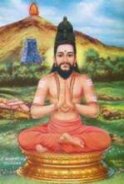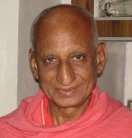

THE ESOTERIC
KANDAR ANUBHUTI
OR
THE SECRET TEACHING ON
GOD-EXPERIENCE
(A Treatise on Adwaitic Realization)
OF
SAINT ARUNAGIRINATHAR

 |  THE ESOTERIC KANDAR ANUBHUTI OR THE SECRET TEACHING ON GOD-EXPERIENCE (A Treatise on Adwaitic Realization) OF SAINT ARUNAGIRINATHAR |  |
 | by N.V. Karthikeyan |  |
| verses contents 42 43 44 45 46 47 48 49 50 51 this verse in PDF version (4 parts) p-1 p-2 p-3 p-4 complete download of this book |
VERSE-48 அறிவொன்று அறநின்று அறிவார் அறிவில் பிறிவொன்று அறநின்ற பிரான் அலையோ செறிவொன்று அறவந்து இருளே சிதைய வெறி வென்றவரோடு உறும் வேலவனே.Arivonru araninru arivaar arivil, Pirivonru araninra piraan alaiyo Serivonru aravanthu irule sithaiya, veri venravarodu urum velavane. Ceasing from every knowledge, those who know, O Lord, Commentary Arunagirinathar in this single verse instructs on the secret and essence of the whole of Jnana Yoga practice and God-Realization, which in the Katha Upanishad is conveyed in many Mantras. This is an exceptionally rare verse. This verse is an amplification of verse-42. God is the Omnipresent Reality. He is everywhere - far and near, outside and inside, above and below. Hence, He is ever with us, too. He is the very essence (or substratum) in us. He is the Atman or the Self in us. Yet, it is an irony that we do not feel Him, experience Him, or realise Him. Why so? There is something fundamentally wrong in our seeking. We seek Him "outside" as an object. But, says the Saint, He is to be sought as our very being, as the Self, as the Knower in us, as the Intelligence in us. How to do this? First, we have to cease from sense-perception, from sensory-knowledge. But, we are so much wedded to the senses that we do not know of any other mode of knowing. To us, what is perceived through the senses is alone real, and even God should come within the ken of sense-perception! This sensory-knowledge (or the extroverted nature of the senses and mind) has to cease first. The senses and mind must turn back; they should become introvert and still by the cessation of all kinds of sense-perception. Not even a single sense, including the mind which is the sixth-sense, should be active. Hence, Arunagirinathar says, "Arivu Onru Ara Ninru," i.e., established in that condition wherein not even a single sense (including the mind) functions. This is perfect establishment in Pratyahara (complete withdrawal of senses) which presupposes the practice of and perfection in Yama, Niyama, etc. After fulfilling this condition, we should "know". But we never do this. Without sense-control, without the practice of Yama and Niyama, without any check on the out-going tendencies of the senses and the mind, we try to do concentration and meditation to realise God. How can it be successful? Hence, "ceasing from every sense-perception", -- "Arivu Onru Ara Ninru," says Arunagirinathar. But when one tries to do this, the mind will play a trick or mischief. The natural tendency of the mind is such that it will either be active or go to sleep. If we check its outgoing tendency (Rajas) and try to concentrate, it will slip into inertia or sleep (Tamas). This contingency has to be carefully avoided. Consciousness must be maintained and this is brought out by the word "Arivaar" (or "those who know"). This 'knowing' is, therefore, after cessation from every sense-knowing. Hence, this is quite a novel method of knowing. It is knowing directly by the intelligence itself, freed from the trammels of the mind and senses. When the senses do not function and the mind is still, the intellect becomes steady. Then the Jiva-consciousness (or Chidabhasa), which is a reflection of the Kutastha Atman (or pure Consciousness) in the intellect, also becomes completely steady or undisturbed, i.e., self-centered or self-conscious. This self-centered Chidabhasa is what is referred to by "Arivu", which is not intellect but the intelligence. That steady Chidabhasa is indistinguishable from the Kutastha, as the two stand together. Hence, the Jiva-consciousness should first be freed from objectification (Arivu Onru Ara Ninru -- அறிவொன்று அறநின்று); it should also maintain consciousness, i.e., not go to sleep (Arivaar -- அறிவார்); in that non-objectified Chidabhasa coupled with self-awareness (Arivil -- அறிவில்), God (or Reality) stands in union without the least separation (Pirivu Onru Ara Ninra Piraan -- பிறிவொன்று அறநின்ற பிரான்). What is this "union without the least separation"? The Kutastha Chaitanya (or the Atman) is the unchanging Reality. It is the witness consciousness that ever shines. Its reflection in the intellect is the Jiva-consciousness (or Chidabhasa). Ceasing from sense-perception, when the mind becomes still and the intellect steady, the reflection in it (or the Chidabhasa) also becomes steady and is in union with the Kutastha Atman. This can be made clear with the help of an illustration. The sun shines. Its rays fall on a clean mirror, from which reflection-rays emanate. The sun may be regarded as the Kutastha and the reflection the Chidabhasa. The mirror, like the intellect, is the medium of reflection. Now, at the point of reflection in the mirror, where the sun's rays fall and the reflection emanates, the two are in inseparable union. At this point, we cannot say whether it is the sun's ray or its reflection-ray. Whatever we may say, it is right; because both are there together and inseparably. The two cannot be distinguished at that point. This is the condition of the Chidabhasa and Kutastha in the higher reaches of meditation wherein, due to establishment in Pratyahara (or sense-control) and Dharana (or concentration of mind), the Chidabhasa (Jiva) comes back to the source (or point of reflection) and shines not on any object but on the Kutastha (God) itself. In that reach of meditation, the two are in inseparable union, as the point in the mirror; and the notion of "I" here can equally refer either to the Kutastha or Chidabhasa, according to whichever it chooses or feels. Peculiarly enough, there is a subtle but vital difference between the sun's reflection in a mirror and the Kutastha's in the intellect. In the former case, the original (the sun) and the medium of reflection (and, therefore, the reflection) are apart, as the sun is a limited object; in the latter case, the two are ever together, as the Kutastha is all-pervading. Hence, when the outgoing tendency of the Chidabhasa is totally suspended, it returns to its source where it stands in its natural state of inseparable union with the Kutastha. This condition is experienced by us daily, in the state of deep sleep. But, there is no awareness then, and that makes the difference between sleep and meditation. The non-objectified awareness bereft of self-consciousness is sleep; the non-objectified awareness coupled with self-consciousness is meditation (Dhyana). Yet, this is not the highest attainment of Yoga, which is Self-realization, because the cause of Jivatva is still there, Avidya not being destroyed. The highest attainment is Samadhi (or super-consciousness), which is still higher. Hence, Arunagirinathar continues the verse and says something more, which indicates that this state of Yoga (or "union without the least separation") should become abiding, whereby Avidya (or the cause of Jivatva) will be destroyed, when the Kutastha (or the Lord) alone will shine, i.e., Samadhi (super-consciousness) would supervene. Now, back to the point. In the highest reaches of meditation, Chidabhasa (Jivatman) is in inseparable union with Kutastha (Paramatman). This is not an easy attainment and even when this is achieved with great effort and dexterity, it does not last for more than a moment, in the initial stages. This union comes and goes like a lightning flash. "One becomes vigilant then," says the Kathopanishad, "for Yoga is acquired and lost." Hence, by repeated practice and vigilance, such moments of flash have to be intensified and made frequent, until finally this union (Yoga) comes to abide permanently, which is Samadhi. What happens when the practice is, thus, persisted, is graphically portrayed in the latter half of the verse in which is implied all that is mentioned above. Vikshepa comes to an end; Avarana is destroyed; the great delusion of Avidya (ignorance) is overcome; and, with that blessed soul, the Lord abides eternally. Arunagirinathar uses the term "Veri" for Avidya (ignorance). "Veri" means delusion, confusion, madness, ignorance, etc. It, therefore, denotes Avidya. And he also clarifies what this Avidya is. It has two aspects (or powers), viz., Avarana and Vikshepa. Avarana is the screening power and Vikshepa the projecting power. Avarana is the screen-like darkness (Irul) that hides Reality (or Atman), and Vikshepa causes tossing of the intellect and the mind on account of which duality is perceived and relationships are established with the world outside. External relationships with the world of objects are brought about by one or more of the five senses, which are activated by the mind agitated by desires or Rajas. This distracted condition is called Vikshepa. In the Pratyahara-perfected meditation this sense-activity completely ceases. Not even a single kind of relationship is had with the world, because not even a single sense operates. Hence, Arunagirinathar says, "every relation having ceased" (Serivu Onru Ara Vandu because of Arivu Onru Ara Ninru). This cessation of all relations is freedom from Vikshepa, which means a total annihilation of Rajas. This is the precondition for the destruction of the veil of darkness (Avarana), which is predominantly Tamas. When Vikshepa is overcome and the senses and mind are totally brought together, the mind becomes tremendously powerful as there is no dissipation of energy through sense-activity. With this extraordinary, concentrated power, if the mind is not allowed to slip into inertia (or sleep) but awareness maintained, the darkness (or the veil) of Avarana is destroyed. Thus, when, by repeated practice, the state of Yoga (inseparable union) attained in the highest reaches of meditation becomes abiding, every relation with the world (Rajas or Vikshepa) comes to an end and darkness (Tamas or Avarana) is destroyed. What happens, then? Vikshepa and Avarana being the two powers of Avidya, their destruction is the annihilation of Avidya itself. The Jiva being Malina Sattva, i.e., Sattva mixed with Rajas and Tamas, with the cessation of Vikshepa (Rajas) and destruction of Avarana (Tamas), the intellect which is the medium of reflection becomes Sattvika (or Sattva-preponderated); and in it, the Kutastha Chaitanya (or the Witness consciousness) shines unobstructed and undistracted. The Kutastha is referred to as the 'Velavan'. It is the Vel-consciousness referred to in many earlier verses. Out of the many names of Lord Skanda, Arunagirinathar significantly uses "Velavan" here to suggest that the Lord abides forever in those that have, thus, overcome their ignorance, as Wisdom or Consciousness. Such blessed souls are the Jivanmuktas, Jnanins, sages, or God-men who have attained the Goal. In this single verse, Saint Arunagirinathar dexterously and precisely brings together the imports of the concluding teachings of the Kathopanishad - of Mantras 10, 11, 14, and 15 of Valli VI. The first half of the verse may be said to correspond to Mantra 10 which says, "When the five organs of knowledge stand together with the mind and the intellect does not function (i.e., becomes calm), that they call the highest state." This seems to be the highest state reached in meditation and not the highest attainment itself, for this Yoga (or "union without the least separation) is lost, if one is not vigilant. Hence, Mantra 11 gives a note of warning: "The firm control of the senses, they regard as Yoga. At that time one gets careful, for Yoga is acquired and lost." Thus, if, with utmost care, this awareness of Yoga (union) is repeatedly had and made abiding, in due course the knots of the heart are broken and the goal is attained, as revealed in Mantras 14 and 15. "When all desires that dwell in the heart of one cease, then the mortal becomes immortal and here attains Brahman." "When all the knots of the heart are severed here on earth, then the mortal becomes immortal, so far is the instruction." The destruction of the knots of the heart (Avidya, Kaama, and Karma) of the above Mantras are precisely conveyed by Arunagirinathar in the latter half of the verse - Avidya is explicitly mentioned, and Avarana and Vikshepa may be said to correspond to Kama and Karma, respectively. The need for continued practice with vigilance, which is the import of Mantra 11, can also be seen hidden and implied in the wordings of the last two lines of the verse, which are so aptly composed by Arunagirinathar as to bring out this implication, effectively. |
| contents 42 43 44 45 46 47 48 49 50 51 this verse in PDF version (4 parts) p-1 p-2 p-3 p-4 |
| ... www.kaumaram.com ... The website for Lord Murugan and His Devotees முகப்பு கௌமாரம் அட்டவணை மேலே தேடல் home Kaumaram contents top search |
Kaumaram.com is a non-commercial website. This website is a dedication of Love for Lord Murugan. Please take note that Kaumaram.com DOES NOT solicit any funding, DIRECTLY or INDIRECTLY. |